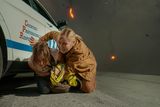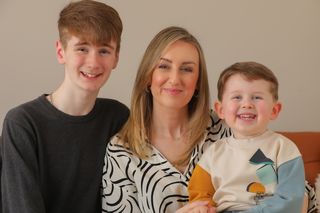Cinema reviews: A Little Chaos is rather full-bodied
Cert 15A
You expect any attempt by cinema to venture into the pomp and luxuriance of Louis XIV and the Palace of Versailles to be rife with excess and frilly posturing, but A Little Chaos dispels such fears. This is the first thing Alan Rickman should be congratulated on in this, his second time in the director's chair.
Its earthy tones might have something to do with the many years - 17 to be precise - since Rickman and Dublin-born writer Alison Deegan first conspired to film the latter's tale, lots of time to fine-tune ideas on how such a genre piece might stand apart.
Deegan's screenplay has a contemporary feel to it in that it plonks a female garden designer called Sabine De Barra (Kate Winslet, sturdy) into an age where women were mostly wilting, fanning ornaments. There, she rolls up her sleeves, gives the orders and gets mud under her fingernails after she is charged with creating an elaborate installation in the Gardens of Versailles.
Understandably, her gumption wins hearts (love interest Matthias Schoenaerts, a dandy Stanley Tucci, and eventually Rickman's statuesque monarch himself) and riles others into sabotage. All the while, Sabine is trying to make peace with her deceased daughter.
All the things we want from such fare come ready packaged - heaving romance, regal genuflections and elaborate get-ups (full marks to Irish costume designer Joan Bergin) - but it is populated by what feel like real people, not just period-drama caricatures. This gives things a rather full-bodied, involving flavour. A cut above mere "mum bait".
HAW
Now showing
Editor's pick: Glassland
Cert 15A
Gerard Barrett's 2013 faux-documentary Pilgrim Hill was less than cheery viewing but was none-the-less an impressive debut by the then-23-year-old who had borrowed €4,500 from his local credit union to fund the project.
It meant the writer-director couldn't be ignored, especially in terms of Film Board funding for this big step into the realm of proper feature-length drama.
Glassland is a different animal to Pilgrim Hill. While the sky is still very much set to "overcast", it is more substantial in terms of dramatic structure, something that was sacrificed in that first outing in favour of pathos and mood.
Jack Reynor stars as John, a Dublin taxi driver trying to manage his alcoholic mother (Toni Collette) and Down Syndrome brother. She requires major rehab which will cost more than is possible on a cab-driver's wage. John is thus forced to go down criminal routes to fund this, the costs of which go beyond financial.
Meanwhile, best pal Shane (Will Poulter) is off to Australia, something John would be a prime candidate for were there not so many fragile family plates spinning at home.
Glassland is in ways a performance-led victory - Reynor, Collette and Poulter are all on fire, the latter two completely at home amid Dublinese joshing and Irish emotional evasions. This is a reflection of Barrett's skill in itself, but he shows signs of being an auteur of real poise too, lingering on expressions and moments until they sear.
It feels incomplete narratively, however, leaving a feeling that when the Kerryman is as accomplished with the pen as he is the camera, we'll have a world-class talent on our hands.
HAW
Now showing
Dark Horse
Cert Club
In 2000, Jan Vokes, a barwoman at a working men's club in hard-times Wales, decides to acquire a racehorse. She ropes in husband Brian and a merry band of locals looking to hinge their fortunes on something, anything, that might lift them out of the fug of mine closures and a community that is struggling to get by.
They pool their cash and buy a £300 mare from a shoddy yard, and pair her with a stallion way past his prime. The resultant foal is raised on a muddy allotment and sent to an expensive training stable. Everyone in the syndicate crosses their fingers.
Jump forward a couple of years and Dream Alliance, as they name him, is defying all the odds and beating horses that have both blue-blooded pedigree and serious financial capital behind them. When he takes a bad fall at Aintree it looks like his game is up, but Jan and the syndicate pour every penny they've made in prizes back in to paying for rehabilitative stem-cell treatment, their determination to save the horse outweighing the sensible and less costly option of simply having him put down.
He makes a miraculous recovery and returns to win the Welsh Grand National. The climax of Louise Osmond's documentary is a thrilling return to Aintree, the scene of Dream Alliance's horrific accident, but most of the magic of this delightful little film has been conjured effectively by this stage.
Working-class heroism, unlikely sporting triumphs, and animals - Dark Horse has it all. Like a mix of The Full Monty and Seabiscuit, it canters beautifully through this incredible true story, and like all the best films about remarkable animals, makes you think more about human behaviour than equine.
Much of this is down to an irresistibly buoyant, flab-free rhythm, one filled with characters so vital, passionate and self-effacing that they couldn't be made up. Osmond carefully places the economic hardship and class issues within the backdrop, using them to quietly contextualise without turning this real-life fairytale into an all-out lecture on the ills of Britain's social structures.
Effortlessly enjoyable, and an outside chance as one of the feel-good hits of 2015.
HAW
At Light House Cinema
The Salvation
Cert 16
A founding member of the notoriously chaste Danish film-making movement Dogme95, Kristian Levring appears to have ditched that coven's attitude to frills and FX. In fact, The Salvation, a generic western seen through a slick Scandi prism, is arguably one of the most glossy and CGI-smattered of its genre since Will Smith's horrid Wild Wild West.
The comparisons end there, mind. While the clouds, streets and rubbish-looking vultures all hover cartoonishly over this by-numbers revenge yarn, some of its ingredients are to be admired, particularly the slightly Snyder-like graphic novel quality that imbues the whole thing.
Mads Mikkelsen is Jon, a Danish immigrant in 1870s wild west who has just greeted his son and wife off the train after seven years apart from them. No sooner have they set foot on the continent than they are the subject of a particularly unpleasant death at the hands of bad sorts. A vengeful Jon quickly fixes their wagon but in doing so invokes the wrath of a local crime lord (Jeffrey Dean Morgan) who the townsfolk of Black Creek tremble in fear of. Like all these situations, things have to get worse before they can get better, and Jon rides into town to take out the trash, as it were.
Apart from cinematographer Jens Schlosser's annoyingly shiny gloss on every surface, there is little in The Salvation that you won't have seen already in the genre. Levering's attempts to hint at the oil-mad society that would grow out of this region sit awkwardly alongside the quick-shooting and glass-chewing of the various character tropes.
What rescues it all is a nicely odd supporting cast comprising a mute Eva Green, a shifty Jonathan Pryce and Eric Cantona's gallic henchman. Not a bad final showdown either.
HAW
Now showing
The Decent One
No Cert IFI and Selected
While there is an undeniable fascination in why, how and in what ways evil people are different from us, there is something truly terrifying in how they are the same. Heinrich Himmler, head of the SS in Nazi Germany, was arguably more involved in the mass exterminations than anyone. The story goes that when his marital home in Bavaria was occupied, Allied forces, breaking established protocol, kept the letters, diaries and photographs they found there. Sold on the black market they were kept in Israel until Vanessa Lapa's father bought them some years ago, and it is on them that she has based the film.
AO'C
Join the Irish Independent WhatsApp channel
Stay up to date with all the latest news














